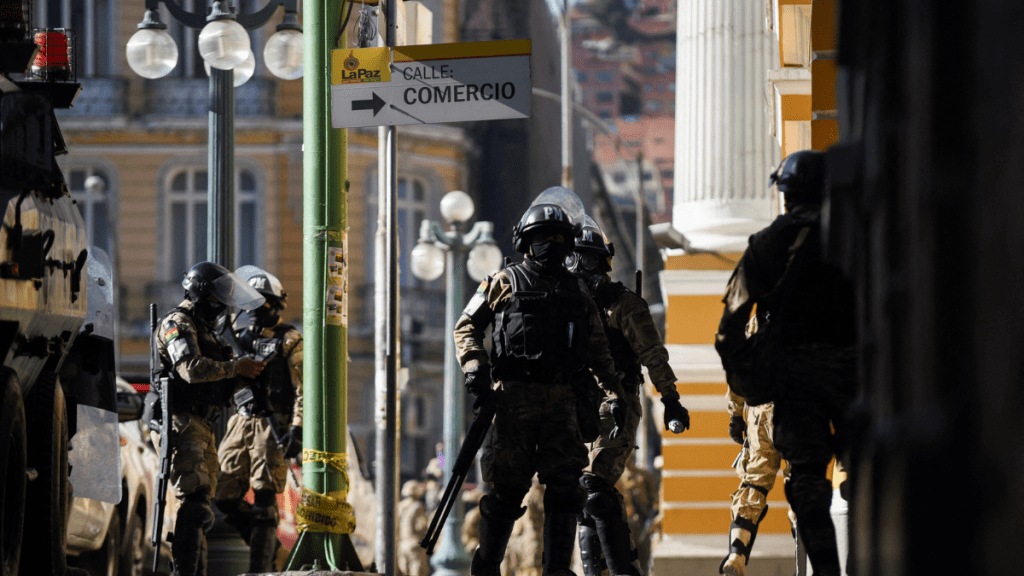By Dr Aparaajita Pandey
As Bolivia moves towards the next Presidential elections in 2025, some disturbing developments have come to light in the past 24 hours. The world woke up today to the news of an attempted coup that was thwarted by the Bolivian President Luis Arce. Amidst the condemnation of the attempted Putsch, from around the world and Latin American countries, it is important to examine the factors that have contributed to this coup. This coup has its roots in deep seated factors that are not just in immediate socio – political circumstances of the Bolivian nation but also the racial, ethnic, and political chasms in the society as well as the intervention by Latin America’s neighbours to the north.
Bolivia has the largest percentage of indigenous peoples as a part of a country’s population in the Latin American continent. However, the journey that the indigenous communities have had to take towards political representation and participation is a long and arduous one. Evo Morales became the poster child of this journey when he first became the President of a largely indigenous country where its people were trying to find their place in the political system of their own nation. Evo Morales was the first indigenous man to become the President of Bolivia in a political system that was largely dominated by the fair skinned peninsulares who had enjoyed the advantages of colonial rule.
Morales became even more important and memorable when during his presidential years, he decided to nationalise Bolivian Natural Gas reserves. A decision that was seen as not just a step towards strengthening Bolivia as a nation, but also the manifestation of the notion of national resource wealth and the concept of owning of natural resources. It was also a showcase of resource nationalism which is abundant in Latin American politics. This sort of resource nationalism is also born out of the discourse surrounding the natural wealth that the native people – the Indios of Latin America and the Caribbean were stripped away from by the colonisers from the Iberian Peninsula or the Peninsulares. This is a discourse and a reality that has constantly been repeated in power structures across the Latin American continent.
Evo Morales and his kind of politics not only shifted the popularly accepted and conventional power accumulation in certain sections of society, it also changed the axis of political ideology on the political spectrum, tilting it more towards the left than right. Evo Morales was the Bolivian President for thirteen years and then was succeeded by Luis Arce in 2019 who is also of indigenous descent and once was an ally. He continued with Morales’ left of centre policies and has shown no intent of changing his ideology. Morales’ succession was not without conflict. The constitution was amended to limit a person to two Presidential terms while Morales wanted to contest again for the third time. After this strife for ten days, Luis Arce became the President.
However, Arce has not been able to alleviate people’s woes. The people are impoverished, and are facing problems with rising inflation and not enough employment opportunities. These are the problems that were cited by General Jose Zuniga who orchestrated the coup attempt, which was suppressed as quickly as it began. As Luis Arce asserted his authority over the Bolivian Armed forces reiterating that he was their supreme commander and the forces must obey his orders, support poured in for the Bolivian government and people.
It is not clear who all supported the coup from outside of Bolivia, but there are plenty who believe that the coup once again would be supported by those who have orchestrated coups in the Latin American continent for ages. It is not too far fetched to think that a regime that is favourable to the political ideology of the US would be beneficial in terms of the growing inroads that China has made in the region. But these are only speculations and as of now, the responsibility of the coup lies with the faction of the army that was dissatisfied with Arce’s governance.
The failure of the coup, however, has been celebrated openly by other Bolivian neighbors. Brazil, Peru, Paraguay, and even Venezuela have congratulated the people of Bolivia and shown concern on the concentrated effort to topple democracy. It remains to be seen how the political campaigns in Bolivia now evolve till its time for the people to vote in 2025.
Author has a PhD in Latin American Studies from JNU.
Disclaimer: Views expressed are personal and do not reflect the official position or policy of FinancialExpress.com Reproducing this content without permission is prohibited.

